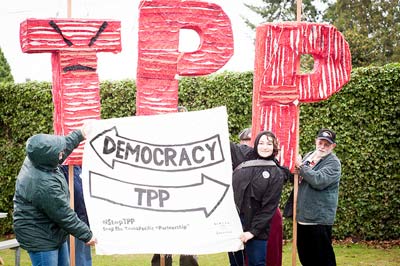
The Trans-Pacific Partnership (TPP) stands at the top of the Obama administration’s trade agenda. The argument from its supporters is that this agreement is part of the never ending quest for freer trade. The evidence from what we know of this still secret pact is that the TPP has little to do with free trade. It can more accurately be described as a pact designed to increase the wealth and power of crony capitalists.
At this point, with few exceptions formal trade barriers, such as tariffs and quotas, are not very large. If lowering or eliminating the formal barriers that remain were the main agenda of this pact, there would be relatively little interest. Rather, the purpose of the pact is to use an international trade agreement to create a regulatory structure that is much more favorable to corporate interests than they would be able to get through the domestic political process in the United States and in the other countries in the pact.
The gap between free trade and the agenda of the TPP is clearest in the case of prescription drugs. The U.S. drug companies have a major seat at the negotiating table. They will be trying to craft rules that increase the strength of patent and related protections. The explicit purpose is to raise (as in not lower) the price of drugs in the countries signing the TPP.
Note that this goal is the opposite of what we would expect in an agreement designed to promote free trade. Instead of having drug companies at the table, we might envision that we would have representatives of consumer groups who would try to negotiate rules that could ensure safe drugs at lower prices. Instead of using a “trade” agreement to try to push drug prices in other countries up, we could actually use trade to bring the price of drugs in the United States down to the levels seen elsewhere.
Insofar as this creates problems for the model of government granted patent monopolies as the main tool for financing research, we could even look to promote methods of research financing that don’t have their origins in the medieval guild system, like patents. Everyone, including the drug companies, seems to think that the $30 billion we spend on research each year through the National Institutes of Health is extremely valuable. This suggests that there are other ways to finance research.
We could also look to have freer trade in doctors. The doctors’ lobbies have erected numerous barriers to keep qualified foreign physicians from practicing in the United States. There are enormous potential gains from eliminating these barriers. If we got the pay of doctors in the United States in line with doctors’ pay in other wealthy countries, the savings would be close to $1 trillion over the next decade. That comes to around $7,000 per household.
It is striking that we openly make deals to bring in foreign nurses to lower the pay of nurses in the United States, but can never even discuss doing the same with doctors. The potential benefits to the United States from importing doctors are certainly much larger than for importing nurses.
In fact the potential gains from bringing in foreign physicians are so large that we could tax a portion of the earnings of foreign doctors to repay their home countries, and allow them to educate 2-3 doctors for every one that comes to the United States. This would ensure that everyone benefits from freer trade in physicians’ services. The lack of interest in this sort of free trade likely has something to do with the fact that doctors make up a large chunk of the richest one percent.
There are many other areas where we could envision freer trade bringing real gains to the bulk of the population. However this is not what the TPP is about. The TPP is about crafting rules that will favor big business at the expense of the rest of the population in both the United States and in other countries.
For example, we can expect to see limits on the ability of national and sub-national governments to impose environmental restrictions, such requirements that companies engaging in fracking disclose the list of chemicals they use. There may also be limits on the extent to which governments can restrict the sale of genetically modified foods, with rules on labeling. And, the TPP may prevent governments from imposing restraints on financial firms that would prevent the sort of abuses that we saw during the run-up of the housing bubble.
The world has benefited from the opening of trade over the last four decades. But this opening has been selective so that, at least in the United States, most of the gains have gone to those at the top. It is possible to design trade deals that benefit the population as a whole, but not when corporate interests are literally the negotiators at the table. Rather than being about advancing free trade, the TPP is the answer to the question: “how can we make the rich richer?
Trump is silencing political dissent. We appeal for your support.
Progressive nonprofits are the latest target caught in Trump’s crosshairs. With the aim of eliminating political opposition, Trump and his sycophants are working to curb government funding, constrain private foundations, and even cut tax-exempt status from organizations he dislikes.
We’re concerned, because Truthout is not immune to such bad-faith attacks.
We can only resist Trump’s attacks by cultivating a strong base of support. The right-wing mediasphere is funded comfortably by billionaire owners and venture capitalist philanthropists. At Truthout, we have you.
Our fundraising campaign is over, but we fell a bit short and still need your help. Please take a meaningful action in the fight against authoritarianism: make a one-time or monthly donation to Truthout. If you have the means, please dig deep.